- Home
- Martin Cruz Smith
Nightwing Page 5
Nightwing Read online
Page 5
“I need it!” Paine shouted.
The muzzle of Youngman’s rifle burrowed under Paine’s jaw. Paine rocked slightly back, his head against the wall. His fingers let go of Youngman, who screwed the barrel into the jaw.
“You lied,” Youngman said in a flat voice. He was sure the other man understood. “I don’t know what about, but you lied.”
He took two steps back and lowered his aim to the doctor’s belt buckle. Paine gestured with his hand and stopped himself at the glint of the hammer’s rise.
“You’re making a mistake! Deputy, I need that sample! You don’t know what you’re doing! Please!”
Youngman’s foot shoved the aluminum case over the floor.
“Go play with the Navajos. They’ll believe anything.”
Paine’s expression said he couldn’t hear Youngman over the thunder, so Youngman opened the hogan door. The storm spilled in. The road outside was a shallow river.
“You could be next,” Paine warned. At least, Youngman thought that was what he said because with the door open not even a shout was intelligible. Paine gathered his case and went into the rain, having to stop to unlock the Land Rover. Youngman watched from the hogan doorway and noticed the Health Service van pull in behind his jeep. Why, Youngman asked himself, would anyone lock his car in a place like Gilboa? He waited until the Land Rover moved away, lights on and wipers thrashing the windshield. At a distance of fifty feet, only its rear lights could be seen through the rain.
Anne Dillon threw open the door of the van. Youngman climbed in, as wet as if he’d stood under a shower, and dropped his hat and rifle onto the firewood on the backseat.
The van was better insulated than Youngman’s office. A person could talk.
“I see you’re still busy promoting tourism.” She turned to Youngman. “I’m sorry about Abner.”
“So am I.”
“But what I came for was an apology.”
“I apologize.”
“That’s not good enough. I finally get these foundation people to come all the way out here from the Midwest and the very first thing you do is insult them and embarrass me. Since when are you the guardian of all that’s sacred around this place? You made a fool of me. Then you apologize and I’m supposed to forgive you.”
“Well, you’ll try. You’ll try like hell.”
Anne’s eyes were blue, but rayed with spots of brown. Sometimes, very analytical eyes.
“You know, Youngman, that’s an incredibly cruel thing to say. I don’t have to love you. I can try like hell to stop doing that.”
“What does it matter?” he asked.
“What does that mean?”
“I mean, you’ve got one more week before you leave the reservation for good and go back to your trust fund and backgammon or whatever rich folks do in Phoenix. I thought we were going to have the week together but it looks like you’re busy with your birdwatchers, or missionaries, whoever they are. What is it they do anyway? Give money to the needy? Or only to the romantically needy? Where does their money come from?”
“Some religious groups, mostly corporations.”
“Better yet. A romantic tax deduction. That’s tops. Speaking as one of the needy, you understand. So do that, have your kicks. Better yet, share your kicks with them. White Goddess of the Hopi, saint of eye salve.”
“If we’d had the whole week together, is this what you were going to tell me?”
“What else?”
He watched the rain smashing into the windshield because she was staring at him. It took him a while to notice her eyes welling.
“No,” Youngman said. “I wouldn’t have said any of that. I’m a jerk, and I’m goddamn jealous.”
She pulled him against herself. Her fingers dug into his back and he felt a tear hot on his neck.
“Jealous I accept,” Anne whispered. “The rest you can stuff.”
“I’ll have a whole week to stuff it.”
“I wish they hadn’t come, now. They’re waiting for me.”
As they kissed, his hand slipped into her shirt and brushed a breast softly so that its tip hardened against his palm.
“It won’t be a whole week with them, just four days,” she said.
Anne shifted, stretching out on the seat.
“Maybe I should go with you.” Youngman covered her.
“Um, that kind of romantic needy they’re not ready for. That’s just my hang-up. Can they see from the trading post?”
“They can’t see a thing.”
Anne had come to the reservation two years before, using volunteer paramedical service as her escape from Phoenix and a family fortune that was based on buying desert cheap and selling it dear as test range acreage to the Air Force. Life for the Dillons was the Southwestern dream: Arabian horse shows, golf in Scottsdale, a box at the Sombrero Playhouse, and monogrammed tennis balls from Neiman-Marcus. In Anne’s eyes, the dream was a kind of sleeping sickness that infected everyone she knew. This whole class of sleepwalkers lived out their lives seemingly unconscious of Chicano barrios, black slums, and Indian poverty. By the time she was in college she’d diagnosed one peculiar syndrome of this “sleep,” the idea prevalent in this privileged class that somehow they were the true natives and that everyone else, particularly the poor of different colors, was an interloper. Hence, Chicanos were more likely to be called Mexicans. Blacks were Nigras. A dead Indian was an interesting item of Western Lore, but a live Indian was a social ill. And it was easy to live out this dream because accepting the rights of these less fortunate groups—especially the land and water rights of the Indians—led inevitably to uncomfortable sensations of guilt. Phoenix did not believe in guilt, it was not part of the life-style.
Guilt. Anne worked out of Hotevilla Pueblo on the mesa. Driving a hundred miles at a time throughout the mesa and into the desert to provide antibiotics and basic surgery to outlying pueblos, she had a great deal of time to consider social guilt as a motivation. Early on, she decided it stank. Indians stank, the pueblos stank, and the chronic running sores she dealt with day after day had a tendency to stink. After six months she thought she was ready to quit and trade in her jeans for tennis whites. From nothing less than perversity, she stayed for another six months and curious things happened. Either Indians stopped stinking, or she stopped smelling them. Increasingly she found herself surprised to be treated as a white by white tourists visiting the reservation. And she met Youngman.
Their paths had crossed a number of times before, enough to form an unspoken dislike between them. On this occasion she’d gone to the hill country around Moencopi, an area claimed by both the Hopis and Navajos, to treat a boy bitten by a rabid coyote. Navajo police and Youngman arrived to destroy the animal, which had taken refuge in a storehouse. While the Navajos waited outside the storehouse with their rifles, the Hopi deputy went in with a blanket and a pistol. At the cost of one bite through the blanket, he shot the coyote. For the next four days, Anne treated the boy and the deputy with a series of painful injections in the abdomen. On the very first day she told Youngman he deserved the pain for going into the storehouse instead of waiting. He answered that the family’s chickens and rabbit pens were at the top of the storehouse and if the coyote had broken into them half the family’s yearly food supply would have been wiped out. She was on hand with medicine, so what did he have to lose? Except pain.
Within a month, she was meeting Youngman regularly at different places on the mesa and in the desert. They reversed the usual order of a relationship, starting with the physical release of sex, and then talking and releasing loneliness. Love, each felt, came in spite of them. Now, with her leaving the Health Service and the reservation, love was nothing less than a burden, the embarrassing souvenir.
She clung to him, holding him inside her. But the storm was fading into squalls. Cold, liquid shadows ran over her arms.
“I’ve got to go. You can wait another four days, can’t you?”
“Selwyn’s girls haven’t sedu
ced me yet.”
“Not for lack of trying. They’d kill me if they had a chance.”
“Well, watch out for falling pots.”
“I really have to go.” Anne kissed him and pushed him up.
They sat up and pulled their clothes back together. The rain was easing, almost over.
“Who was that you kicked into the street?”
“Nobody. He had some phony story about a study of antibodies in the blood to find diseases.”
Anne buttoned the rest of her shirt in silence.
“How do you know it was phony?” She brushed her hair back.
“I just did.”
“Youngman, that’s exactly the study the Health Service was supposed to do years ago. And you kicked him out? Don’t you know how many Hopis I have to treat for pernicious anemia or blood parasites?”
She felt her anger rising, she couldn’t help it.
“It was a phony story,” Youngman repeated.
“How many go blind every year from venereal disease, or deaf from aural atresia? Why didn’t you let me talk to him? He didn’t have any accreditation?”
“A letter from Window Rock,” Youngman admitted. He didn’t mention what Paine was doing to Abner, he didn’t want any defense.
“Oh, that was it. He only had a letter from the Navajos and that wasn’t good enough for you. Thank you very much. Maybe I would have had a different opinion.”
With every word, she felt him withdrawing and shutting her out. What’s the use, she thought. Together, they were the perfect example of centrifugal force. Why was she exhausting herself against it? Youngman fumbled in the glove compartment for cigarettes.
“Smoke your own,” Anne said.
“Yours are stale.”
“So?”
“Might as well smoke them now.”
Besides his stubbornness, his habits of poverty also irritated her. In fact, smoking up stale cigarettes was one of his prison traits.
“You don’t trust Navajos, you don’t trust whites. Are you paranoid? You hate outside help so much, why do you tolerate me?” she asked.
“I love you.”
“It’s that simple?”
“What could be simpler?”
“Well, I’m leaving this place for good in seven days, Youngman. Are you coming with me?”
“To Phoenix?”
“It doesn’t have to be Phoenix. It can be anywhere. Mexico, if you want.”
“And what would I do there?”
“You happen to be one of the very few Hopis who could make it off the reservation. You know photography, painting. I have enough money for the two of us until you get started.”
“You could stay here, you know.”
“I have stayed. I’ve been the audience for all your battles against the imaginary slights of anyone who tries to help you. Like the way you treated Franklin.”
“He’s going to help me?” Youngman laughed.
“His foundation represents, among other sources, a number of drug companies. What the Hopi people need is a donation of medical supplies and money for a clinic of your own. I was hoping that the last thing I did before I left was guarantee that donation, but so far I’ve spent most of the morning apologizing for you.”
“Don’t!” Youngman’s face darkened. “Don’t ever apologize for me to those people.”
Anne looked out the side window, towards a rainbow that was already fast evaporating. She was more depressed than angry. “Those people” were the pahans, Anglos, whites. By some fluke, Youngman didn’t include her with her own type. The day would come of course, when he would . . . and she was begging him to follow her off the reservation? How crazy was she?
“Maybe it is just sex,” she whispered to herself.
“Maybe.” Youngman’s hearing was too good.
She was damned if she was going to cry in front of him again, so she found the key and started the engine.
“We’ll desert camp for a couple of days and go on to Joe Momoa’s to fish. We’ll come down to the Snake Dance with the Momoas. I’ll see you there.”
“Don’t go.”
“Why not?” Anne rested her hands on the steering wheel.
Youngman didn’t know. He’d said it quickly, not as a conclusion of any thought but from a sudden rush of images through his mind. Joe Momoa’s horses, a sand painting, Abner’s eyes, a stain of black pitch. The smell of that pitch.
“Look,” Anne touched Youngman’s hand. “When I get back we’ll go off for a couple of days alone.”
“It’s not that.”
“Then what?”
Mostly the smell. Once inhaled, it seemed to work into the blood.
“Something Abner said yesterday.”
“Oh.” She could see them. Two Indians drunk under the sun. “That’s it?”
“Why don’t you just go to the mesa now and wait for the dance? If they want to see a lot of Indians, that’s the place to go.”
“They want to go camping.” Anne shook her head and put the van into gear. When she said nothing else, Youngman climbed out and shut the door.
He looked through the window. His black hair hung damp across his forehead. From the driver’s seat of the van, he seemed hardly bigger than a boy.
Anne could think of nothing else to say except that he was wrong. He was too bitter, too silent, too lean, too dark. Too Indian.
Youngman watched her drive to Selwyn’s and then went back into the hogan.
The dead were supposed to be buried before sundown. Youngman didn’t believe in that sort of stuff but Abner did and Abner, after all, was the dead man.
Youngman pulled up a floorboard where there was still a pool of water underneath and washed Abner’s hands and face. With the white paint from Selwyn’s, he decorated Abner’s arms and legs with dotted lines and over Abner’s left eye drew a half moon, the insignia of a priest. He combed Abner’s hair and strung feather fluffs to the hair, wrists, and ankles. He filled the dead man’s palms with cornmeal. Luckily, rigor mortis was past because he had to bind the fingers tight around the cornmeal. He rubbed the rest of the cornmeal over Abner’s face, which was difficult where the flesh was shredded. With his knife he cut holes into the white cotton sack so that it made a “cloud mask” for Abner’s head. Nothing went to waste in the desert, not even the dead; they were obligated to return as rain. After he wrapped Abner in the sheet, he bent and tied the legs into a kneeling position. Abner made a small corpse. Youngman carried him under one arm and a planting stick with the other out to the jeep.
Youngman drove about fifteen miles out of Gilboa until he reached a rise crowned yellow by paloverde trees. There he dug down through two inches of wet soil and three and a half feet of dry sand, laid Abner in the grave in an upright position facing east, and sat down for a smoke.
“Well, uncle, you should have some family here to say a few words. I guess you’re stuck with me. Frankly, I’d rather ask you some questions than give a speech. I sure as hell don’t know if you were a good man or not. To tell you the truth, I don’t even know how important that is.
“You fool them. Don’t come back as a cloud. You come back as a cactus, huh.”
Within the eyeholes of the cloud mask Abner’s lids were shut. A pink spot appeared on the mask around the cheek. As that spot blossomed, other spots grew. Abner was still bleeding.
“Hey, old man, you’re dead,” Youngman said.
Not only the mask was turning red, the sheet was as well. Points of rosy red that spread. Youngman didn’t have the nerve to lift the mask so he lowered himself into the grave and pulled open the sheet. All the wounds that covered Abner’s chest and arms were wet and running. Maybe the ride in the jeep opened the cuts, Youngman told himself. But dead cuts don’t bleed. He reached inside the sheet to Abner’s wrist, which was wet and cold and had no pulse. Then he saw Abner’s hand. It had snapped the string that had closed it and lay open on clots of blood-soaked cornmeal.
As the sun set, an evening wind follow
ed, swaying the branches of the paloverde trees like yellow froth. Youngman filled in the grave and covered it with stones to discourage scavengers. On top of the stones he stood a planting stick, the symbolic ladder from the grave to the spirit world. Wind rattled the stick against the rocks.
“Relax, Abner. Let go of that stick.” The stick stilled. “Try being dead for a while. You might prefer it.”
Youngman drove the same way back to Gilboa. He stopped once to look behind. By then, the last flush of sunlight was hitting the rise, turning the paloverde trees a brilliant red.
According to the Koran, Jesus created the first bat. During the fast of Ramadan, when no believer may eat from sunrise to sunset, Christ was in the hills outside Jerusalem and couldn’t see the western horizon. Taking clay in his hands he made a winged creature into which he blew life. This creature—a bat—flew into a cave from which it emerged each nightfall to flutter around Jesus and tell him of the setting sun.
The ancient Egyptians regarded bats because of their nipples as examples of maternal care. The Chinese character for bat was also used for “happiness,” and some South Pacific peoples prized bats as sexual totems.
But in the New World, the bat was god. His Mayan name was Zotzilaha. Whole cities and peoples bore his name and throughout Mexico temples carried his image: a striding man with the wings, face, teeth, and tongue of a bat, holding a severed human head in one hand and a heart in the other. Zotzilaha, the Bat God who controlled fire, was transformed into the Aztec’s supreme Sun God, Huitzilopochtli, who demanded sacrificial mounds of human hearts cut out by priests attired in bat-skin capes. In 1519, the year prophesied for the return of a lost White Brother, Cortez arrived in Mexico. Armed with a prophecy, and aided by rebellious tribes, he took Montezuma prisoner. The Spanish chronicled attacks of “bloodsucking” bats, but by then the Aztec Empire had fallen.
Gods die, peoples change, and nature persists. For centuries after Cortez, the vampire bats held sway in the Mexican jungle and in the last twenty years, for no reason discernible to man, had been reported moving steadily north. It was a migration of the night, recorded only by random and unscientific accounts of slaughtered goats, cattle, even people in the Sonora mountains.

 Polar Star
Polar Star Red Square
Red Square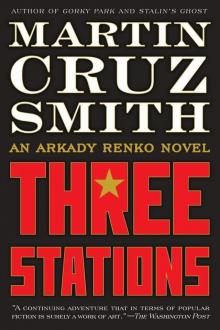 Three Stations
Three Stations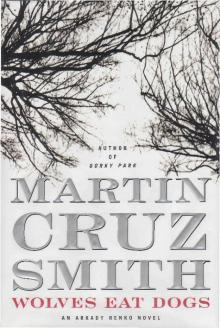 Wolves Eat Dogs
Wolves Eat Dogs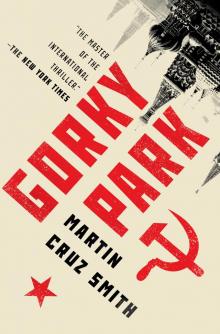 Gorky Park
Gorky Park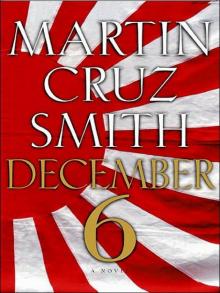 December 6
December 6 Havana Bay
Havana Bay Tatiana
Tatiana The Girl From Venice
The Girl From Venice Stalin's Ghost
Stalin's Ghost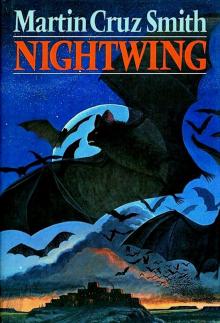 Nightwing
Nightwing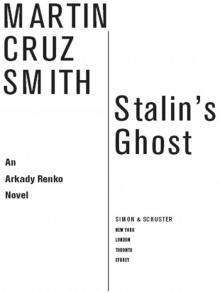 Stalin s Ghost
Stalin s Ghost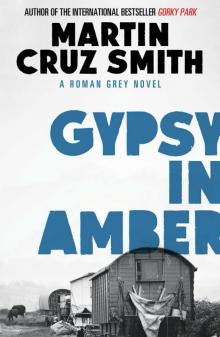 Gypsy in Amber
Gypsy in Amber Rose
Rose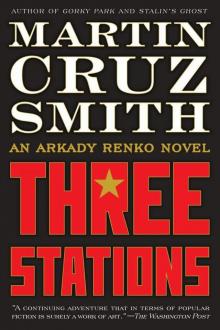 Three Stations: An Arkady Renko Novel
Three Stations: An Arkady Renko Novel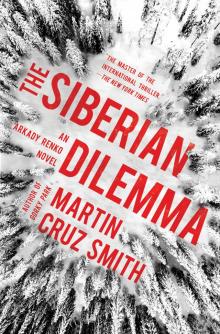 The Siberian Dilemma
The Siberian Dilemma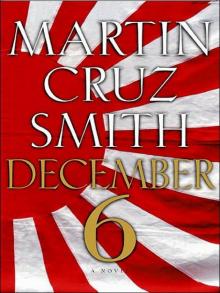 December 6 (V5.0)
December 6 (V5.0)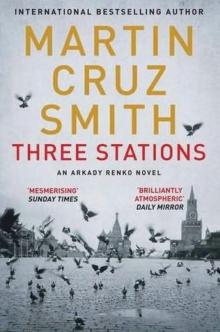 Three Stations ar-7
Three Stations ar-7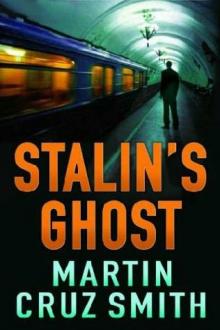 Stalin’s Ghost ar-6
Stalin’s Ghost ar-6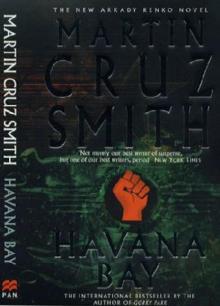 Havana Bay ar-4
Havana Bay ar-4 Tatiana ar-8
Tatiana ar-8